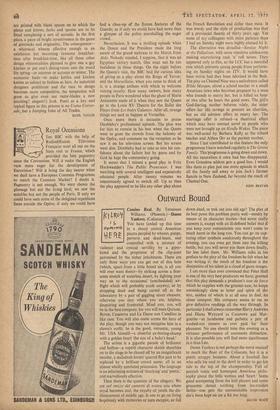Outward Bound
Camino Real. By Tennessee Williams. (Phoenix.)—Damn Yankees. (Coliseum.)
You have landed up this time in a sleazy central American piazza peopled by whores, pimps, perverts and dead-beats, and controlled with a mixture of violence and cynical servility by a gipsy- bawd and the proprietor of the clip-joint patronised by the richer inhabitants. There are only three ways you can get out of this hole (which, apart from a little bored sin, is all you will ever want there)—by striking across a fear- some stretch of waterless desert, by fighting your way on to the occasional (unscheduled) air- flight which will probably crash anyway, or by dropping dead and being carted off to the laboratory by a pair of giggling street cleaners; otherwise you stay where you are, helpless, despairing and frustrated. Mind you, you will be in the best company, for you will meet Quixote, Byron, Casanova and La Dame aux Camelias in like case. You will also come across the hero of the play, though you may not recognise him in a clown's outfit; he is the good, romantic, young Mr. USA himself—a cheerful ex-boxing-champ with a golden heart 'the size of a baby's head.'
The action is a gigantic parade of brilliance and bathos—a superb character sketch shambles on to the stage to be chased off by an insignificant murder, a maladroit lovers' quarrel flits past to be replaced by a brilliant crowd scene; all in an almost wholly unrelated procession. The language is an infuriating mixture of 'shocking' and 'poetic,' and marvellously effective.
Then there is the question of the allegory. We are nel mezzo del cammin di 'rostra vita where royal becomes real, the royalty of youth the dis- illusionment of middle age. Is one to go on living hopelessly with memories or turn, escapist, or fall down dead, or trek out into old age? The play at its best poses this problem pretty well—mostly by means of its character studies—but never really answers it, except with an ill-defined belief that if you keep your romanticism you won't come to much harm in the long run. You can go on cap- turing other symbols assiduously throughout the evening, you can even get them into the killing bottle, but you will never pin them down finally, far less label them. Mr. Williams talks in his preface to the play of the freedom he felt when he was writing it; the result of his freedom is the dissipation of his talent in a cloud of gassy images.
I am more than ever convinced that Peter Hall is one of the very best producers we have; granted that this play demands a producer's tour de force which he supplies with the greatest ease, he keeps astonishingly close to letter and spirit of the text, neither of which is at all easy to find, let alone interpret. His company seems to me to give definitive readings all the way through. In particular I shall always remember Harry Andrews and Diana Wynyard as Casanova and Mar- guerite—as handsome and pathetic a pair of washed-out sinners as ever paid for their pleasures. No one should miss this evening as a virtuoso performance of enormous distinction. It is also possible you will find more significance in it than I do.
Damn Yankees is not perhaps the worst musical to reach the floor of the Coliseum, but it is a pretty scrappy business. About a baseball fan who sells his soul to the devil in order to get his side to the top of the championship. Full of poorish tunes and homespun American philo- sophy about the little woman and 'heart.' Some good scampering from the ball players and some gruesome dorsal writhing from ice-maiden Belita—one gets the unmistakable impression she's been kept on ice a bit too long.
DAVID WAIT


































 Previous page
Previous page